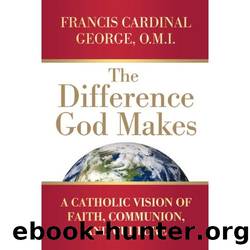The Difference God Makes: A Catholic Vision of Faith, Communion, and Culture (Herder & Herder Books) by Francis Cardinal George

Author:Francis Cardinal George [George, Francis Cardinal]
Language: eng
Format: epub
ISBN: 9780824525828
Publisher: Independent Publishers Group
Published: 2009-10-01T04:00:00+00:00
âSimplyâ Catholicism
The Church does have power given her by Christ: the power to proclaim the Gospel and celebrate the sacraments and pastor Christâs people. Since any claim to power in a popular liberal culture has to be justified by pointing to it as service or by claiming its popular ratification or reception, the Church in this culture is called to examine constantly her use of power. She cannot reduce the Gospel, however, to what the culture will bear. We are back to âsimply Catholicism,â which locates power in Christ and in his gift of authority to the Twelve. The Church preaches Jesus Christ, not herself; but Christ cannot be adequately known except from within his body, the Church.
Within the Church, the bishops are the reality check for the apostolic faith. They are not free to change established dogma nor create new doctrines, unless they want to become heretics. In being presented as a revolution rather than a development of doctrine, the Second Vatican Council has left some Catholics with the impression that bishops control rather than preserve the apostolic faith. If bishops wonât change, they imagine, it must be fear or willfulness or perhaps stupidity that prevents their being enlightened. It is then up to Catholics with an agenda to force them to change or to make the changes themselves, in a separate peace. But a Church of such factions not only cannot evangelize; it cannot think. That is the greatest practical difficulty, it seems to me, in the use of the terms âliberalâ and âconservative.â When they are applied now, or even as they were sometimes applied in papal documents in the last century, people stop thinking things through. In thinking things through in the Church, bishops are the verification principle in the development of doctrine.
Pastorally, bishops are ordained to headship, which does not exhaust leadership. Leadership is influence. Sometimes it is based on office, sometimes on charism or purely personal gifts; always, in the Church, it is more obviously from Christ when the leaderâs friendship with the Lord is evident. When headship and leadership are not adequately distinguished, then either every leader has to become a priest or every priest has to recognize the injustice of co-opting leadership and become just like those who minister only out of the sacraments of baptism and confirmation. In either case, Christâs original gift of the Twelve disappears or is no longer adequately visible.
The Second Vatican Council taught that the bishopsâ discussions with the world should be âmarked by charity of expression as well as by humility and courtesy, so that truth may be combined with charity, and understanding and love. The discussions should likewise be characterized by due prudence allied, however, with sincerity which by promoting friendship is conducive to a union of minds.â3 In other words, the mission of the Church echoes what is in fact the constitution of the Church. The Church is one, holy, catholic, apostolic, and these words also describe the mission. But Church and mission are catholic and so include everyone; no one is counted out.
Download
This site does not store any files on its server. We only index and link to content provided by other sites. Please contact the content providers to delete copyright contents if any and email us, we'll remove relevant links or contents immediately.
What Is the Gospel? (Foreword by D. A. Carson) by Greg Gilbert(989)
Jesus in Me by Anne Graham Lotz(941)
Daily Strength: Devotions for Bible Believing Study by Douglas Stauffer & Andrew Ray & Rick Quatro(896)
Christian Ethics by Wilkens Steve;(854)
The Practice Is the Path by Tias Little(817)
New Morning Mercies by Tripp Paul David(806)
Cleaning Up Your Mental Mess by Dr. Caroline Leaf(738)
Veritas: A Harvard Professor, a Con Man and the Gospel of Jesus's Wife by Ariel Sabar(721)
Greatest Mystery in the World by Og Mandino(666)
The Creative Call by Janice Elsheimer(597)
No More Christian Nice Guy by Paul Coughlin(581)
Our Appointment with Life by Thich Nhat Hanh(571)
Monastic Archaeology by Unknown(564)
2084 by John C. Lennox(556)
This One Wild and Precious Life by Sarah Wilson(542)
Jesus--Awesome Power, Awesome Love (Discover 4 Yourself® Inductive Bible Studies for Kids) by Kay Arthur(533)
The Duties of Parents by J.C. Ryle(514)
The Catholic Verses: 95 Bible Passages That Confound Protestants by Dave Armstrong(510)
The Tale of the Tardy Oxcart (Swindoll Leadership Library) by Swindoll Charles R(493)
